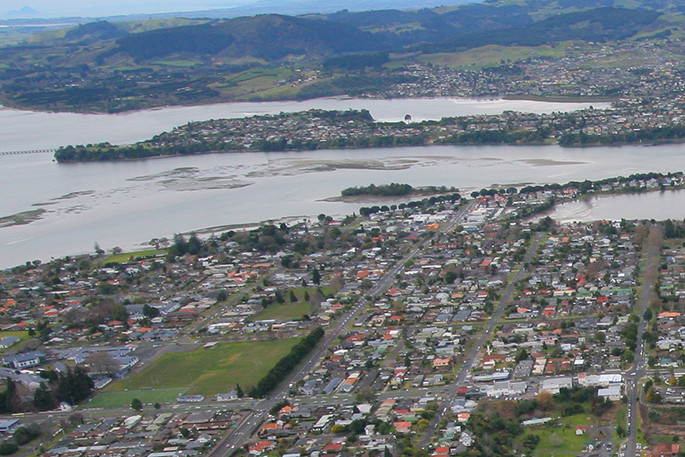Tauranga's rate of home value growth has flat-lined over the last two months, increasing by just 0.2 per cent in February and 0.8 per cent in March.
However, the city's three-month rolling average is still a relatively robust 3.1 per cent – well above the national average of -0.6 per cent – thanks largely to a very strong start to the year, with values increasing by an average of 2.1 per cent in January alone.
QV property consultant Derek Turnwald says it's now officially a buyer's market.
'We're seeing more properties coming on to market as owners, who have held off until now, realise that the market has finally reached its peak. But demand for housing of all values has also declined and is now generally subdued.
'There are high levels of uncertainty in costs and availability of consumer items, rising interest rates, the conflict in Ukraine, the Covid situation, and low levels of confidence in the residential property market. These factors are likely causing many prospective buyers to step back from the market and wait and see how the short term future unfolds.”
Turnwald says the short-term outlook is that interest rates sre likely to continue rising and banks would continue to follow stringent lending criteria.
'Migration could become more of a significant factor in the housing market as borders begin to open.
'International borders are being opened and we can expect a significant number of expats to return, but it's equally likely that many skilled workers will also migrate to Australia where wages are higher, houses are cheaper, and the cost of living is lower. Younger, skilled people who have not bought their first home are the most likely to be attracted offshore.

Nationally, the average home decreased in value by -0.6 per cent nationally over the past three-month period to the end of March, down from the 2.3 per cent rise in quarterly growth QV saw in February, with the national average value now sitting at $1,046,636.
This represents an average annual increase of 18.3 per cent, down from 22.9 per cent annual growth last month.
In the Auckland region, the average value now sits at $1,503,922, falling -1.5 per cent over the last three-month period, with annual growth of 18.6 per cent, down from the 23.2% we reported in February.
QV General Manager David Nagel says they're seeing quite a rapid decline in the rate of annual growth – especially compared to the early months of 2021, when the market was peaking.
'Now we're seeing much slower growth months and even some value contraction in early 2022. This is particularly prevalent in the main centres where some of the largest value increases over the past two years have occurred.
'Agents are reporting a bounce in sales volumes for March after a very slow start to the year, but levels are still well down on previous years, primarily due to the recent rise in interest rates and changes to credit lending rules. With the massive rise in listings over the past couple of months the balance of power has shifted firmly into the hands of buyers, after such a prolonged period of it being a sellers' market.”
Of the 16 major urban areas QV monitors, 14 have shown a reduction in the rate of three-monthly value growth from the February data, with just Marlborough and Queenstown Lakes value levels holding firm with last month's quarterly growth levels.
'Last month we saw just two major urban areas register a reduction in value levels over the three month period to February, but this month we've seen seven of the 16 areas showing a reduction in value levels.
'And if you look at just March in isolation, there are now 9 of the 16 urban areas showing a value decline, including the main centres of Auckland, Hamilton, Wellington, Christchurch and Dunedin.”
For the future, Nagel says there remains a lot of international uncertainty with the Russia/Ukraine conflict looking like it's set to continue for some time, business uncertainty on the pace of the economic recovery as we continue to deal with Covid-19, and how these will impact on inflation and interest rates.
He says while recent immigration applications are encouraging, the majority of these are already in New Zealand, with new arrivals not expected until later in 2022.
Meanwhile, there are real concerns at the number of New Zealanders likely to be leaving our shores, eroding housing demand further.
'We'll likely see a continued gradual decline in value levels for some of the locations that experienced the greatest value growth between 200-2021, while the regions will likely continue to see a mix of stagnated growth over the coming 12 months.”



0 comments
Leave a Comment
You must be logged in to make a comment.